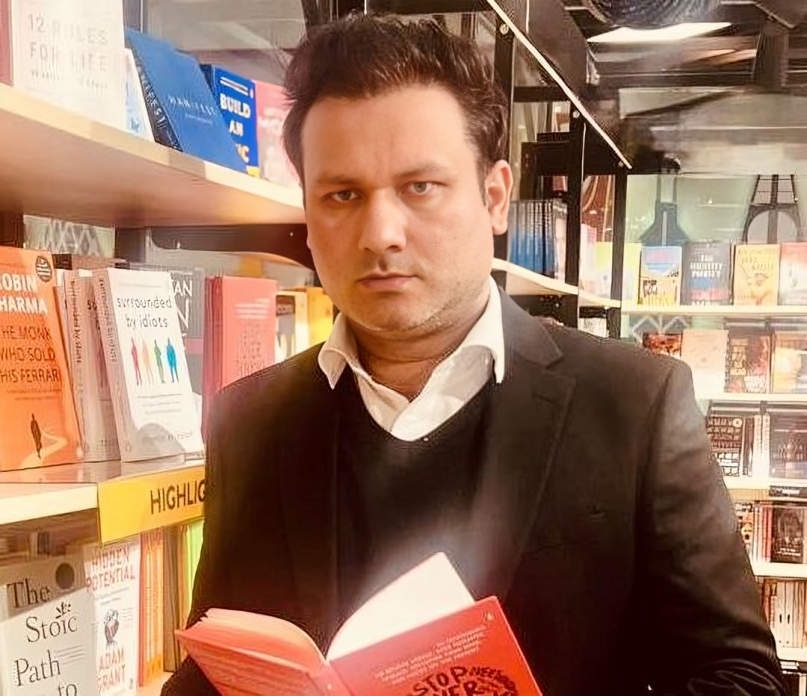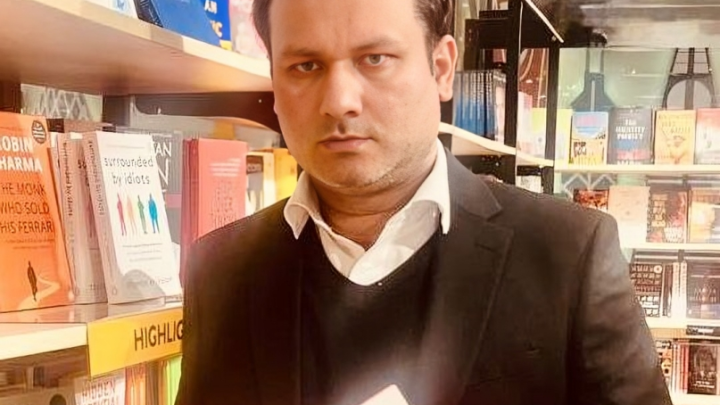Interviews
3791
0
0
“This consistent engagement with the court not only hones your practical skills but also fosters a deeper understanding of legal processes and the nuances of each case.” – Sumit Saddi, Advocate at Punjab and Haryana High Court.
This interview was taken by SuperLawyer Team
Posted on February 22, 2025
This interview has been published by Anshi Mudgal and The SuperLawyer Team

What initially motivated you to pursue a career in law? Specifically, what led you to explore multiple areas such as service, civil, consumer, and criminal law?
Initially, becoming a lawyer was not my first choice. I had always aspired to be an Army officer, and even as I was filling out my forms for law school, I was actively preparing for the CDS exam. However, I was selected for a law college before I could pursue that path. Coming from a family with a background in civil servants, I have always been inclined towards securing a position in a government organization. My decision to pursue law was a significant and transformative one, both for me and my family. During my preparation for law school entrance, as I delved into the Indian Constitution, I found myself deeply connected to the evolution of the country post-1947. It sparked a strong sense of purpose in me, and I realized how impactful law can be in shaping the future of our nation.
Coming from Chandigarh, a tier-2 city, I have come to realize that while the opportunities in corporate law and other specialized fields may be more limited here, it offers a unique and valuable chance to engage deeply with various areas of law, such as service, civil, and consumer law. This environment allows for a more profound understanding of the legal system. In my perspective, anyone looking to start their practice in law should begin by working with district courts and revenue authorities, as they represent the very foundation of our judicial system. Engaging with these entities not only offers a closer connection to the pulse of our legal framework but also provides essential experience in understanding how justice is administered at the grassroots level, which ultimately shapes the broader legal landscape.
Reflecting on the early stages of your career, could you share some pivotal lessons or experiences that had a significant impact on your legal understanding and contributed to your professional development?
As I mentioned earlier, I began my practice at the district courts, where my legal journey immersed me in the dynamic world of courtroom proceedings. One of the most crucial aspects that shaped my legal understanding was the art of cross-examination. This stage of the trial process has always fascinated me, as it offers profound insights into human psychology, behavior under pressure, and the intricacies of how individuals navigate high-stakes situations. Conducting cross-examinations on my own provided me with invaluable lessons, not only honing my legal skills but also deepening my understanding of the human condition.
What concerns me, however, is that the art of cross-examination seems to be gradually fading. I believe this shift is partly due to the growing trend among young advocates to pursue careers in corporate law or other specialized forums, which often overlook the significance of this crucial skill. In my view, cross-examination is not merely a legal tactic but a philosophical exercise in understanding the complexities of truth, human behavior, and the pursuit of justice.
As a panel advocate for several Government organizations, how do you approach case strategy, particularly in complex matters like land acquisition and service-related disputes?
In complex matters such as land acquisition and service-related disputes, it is crucial to have a deep understanding not only of the law itself but also of its origins, scope, and underlying objectives. When you truly grasp the scope and purpose of a legal issue, it becomes easier to make informed decisions and strategically approach the matter at hand. Without this foundational understanding — without knowing why a particular law or rule was established and what its purpose is — it becomes much harder to navigate the complexities of the case. In my view, the answers to such intricate legal matters often lie in the origins of the law itself, as understanding its roots provides the clarity needed to address the issue effectively.
From your experience, what are some of the most challenging constitutional or statutory issues you’ve faced in your legal practice? How do you address such challenges in litigation?
One of the most challenging constitutional or statutory issues I’ve encountered arises when the remedy does not lie with ordinary courts, and we are compelled to approach the High Court or the Supreme Court directly through writ jurisdiction. In such cases, the High Court often has a broader scope when it comes to constitutional remedies compared to the Supreme Court. The difficulty in these situations lies in the fact that essential elements of the trial process, such as cross-examinations and intent, are often bypassed when we directly approach these higher courts.
Addressing these challenges requires a nuanced approach to drafting. I personally prefer to draft my writ petitions in an argumentative style. While many lawyers may not adopt this approach, I believe that when the only available remedy is through the High Court, one must put in their utmost effort. The court often relies heavily on the written submissions, and so the quality of the written material becomes paramount. While oral arguments are certainly important, it is the written presentation that shapes the outcome of the case.
In my view, it’s not enough to merely present questions to the court; it’s essential to provide potential solutions and alternative options for addressing the issue at hand. This, to me, represents one of the biggest challenges we face in legal practice – preparing a case that doesn’t just question the law but offers thoughtful, well-grounded answers to the court, thereby advancing the resolution of the matter.
How do you interpret Section 85G of the ESIC Act, and what are the key legal challenges you encounter when handling disputes under this provision?
Section 85G of the Employees’ State Insurance Corporation (ESIC) Act holds significant importance in addressing the enforcement of provisions under the Act, particularly when it comes to ensuring compliance with the obligations outlined for employers and employees in relation to the ESIC. This provision empowers the Corporation to impose penalties for non-compliance, making it a critical tool for ensuring that the objectives of the Act are met—namely, the provision of social security and health benefits to employees in the event of sickness, maternity, disability, and death.
The key legal challenge I often encounter when handling disputes under Section 85G is interpreting the balance between punitive measures and the broader purpose of the ESIC Act, which is rooted in providing social protection to the workforce. The difficulty lies in assessing whether the penalty provisions, as enforced under this section, are being applied proportionately, keeping in mind the primary objective of promoting welfare and not merely punishing non-compliance. Often, issues arise surrounding the applicability of penalties, the scope of employer responsibilities, and the extent to which employees’ rights are being upheld.
In interpreting Section 85G, it’s essential to understand the foundational purpose of the ESIC Act: to ensure that employees have access to medical care and financial security, particularly in times of distress. If we focus solely on punitive measures without aligning them with the object of welfare, we risk undermining the core philosophy of the Act, which is to act as a safeguard for the labor force.
The challenge, therefore, is not only to navigate the technicalities of the law but also to approach it with a broader understanding of its ethical and social purpose. In disputes under Section 85G, I believe that the resolution should always aim to ensure that the spirit of the Act—social welfare and protection for employees—remains intact, even as we address compliance and enforcement issues. In this way, the legal process becomes a means not just of legal correction, but of fostering a more just and supportive system for workers.
In your capacity as empanelled counsel for Government Organisations, overseeing more than 100 land acquisition cases in Mohali, could you discuss a particularly complex case and the approach you took to ensure a fair resolution of the legal challenges involved?
As an empanelled counsel for various Government Organizations, I have had the privilege of overseeing a wide range of land acquisition cases, including over 100 cases in Mohali. Land acquisition cases, by nature, are often intricate due to the interplay between legal rights, public interest, and the social impact on the affected individuals.
One particularly complex case that stands out involved a dispute over the compensation and rehabilitation provisions for landowners whose land was acquired for a public infrastructure project. The case was challenging not only due to the legal technicalities involved but also because of the deep emotional and economic impact on the affected parties. In such cases, the legal process isn’t just about determining compensation—it’s about balancing public interest with the rights and welfare of individuals.
My approach in this case was twofold: firstly, to ensure a thorough and comprehensive understanding of the legal framework governing land acquisition, including the constitutional principles of fairness and just compensation. This required an in-depth review of the relevant statutes and precedents, as well as the specific nuances of the land acquisition process in Mohali.
Secondly, I sought to address the human element of the case by engaging with the affected parties in a constructive manner. I believe that the resolution of such disputes must go beyond the rigid application of law; it must take into account the broader social impact. To this end, I emphasized the importance of fair compensation, not just in terms of monetary value but also in ensuring proper rehabilitation and resettlement for those affected.
Throughout the legal proceedings, my primary focus was on ensuring that the rights of the landowners were protected while also upholding the public interest. By presenting well-reasoned arguments, addressing both legal and human considerations, and seeking a fair resolution for all stakeholders involved, I was able to guide the case towards a resolution that was just, equitable, and aligned with the broader goals of the land acquisition process.
Philosophically, I view land acquisition not merely as a legal transaction but as a fundamental issue of justice—how we balance the need for public infrastructure and development with the rights of individuals who are directly affected. In this sense, my approach has always been to ensure that the law serves its true purpose: not just to resolve disputes, but to advance fairness and social welfare in a way that respects the dignity and rights of every individual.
What are the primary challenges the Legal Services Authority (LSA) faces in managing the high volume of cases it handles?
The Legal Services Authority (LSA) faces significant challenges in managing the high volume of cases, primarily due to limited resources and a backlog that can delay timely resolution. Another challenge is ensuring equitable access to legal aid, as many individuals remain unaware of their eligibility. Additionally, the allocation of cases to qualified advocates and maintaining the quality of representation amid the large case load can be difficult.
Philosophically, the core challenge lies in balancing the ideals of justice and equity with the practical constraints of the system. The LSA must continue evolving, utilizing technology and increasing awareness to ensure that the principle of equal access to justice is upheld, even when faced with resource limitations.
Given your demanding professional commitments, how do you maintain a healthy work-life balance and ensure your personal well-being while managing your extensive responsibilities?
Maintaining a healthy work-life balance, especially with the demanding nature of my professional commitments, is undoubtedly a challenge. However, I believe that a balanced life is not just essential for personal well-being but also for professional effectiveness. I approach this balance by prioritizing time management and setting clear boundaries between work and personal life.
I make it a point to allocate specific time for relaxation and activities that nourish both my body and mind, such as exercise, reading, and spending quality time with loved ones. These moments of rest allow me to recharge and maintain the focus and energy needed for my legal work.
Philosophically, I believe that a well-balanced life is essential to maintaining clarity in decision-making and ensuring that I approach each case with the full depth of attention and care it requires. If we are to serve others through our work, we must first take care of ourselves, as only a well-nourished mind and body can truly contribute to the well-being of others. By maintaining this balance, I am able to bring a more focused, compassionate, and strategic approach to my professional responsibilities.
How do you define law, and what do you believe is its fundamental role in society? Additionally, which subject you liked the most while studying law? And why?
Before attempting to answer what is perhaps one of the most profound questions pondered by leading legal theorists for centuries, I’d like to approach it in simpler terms. Law, in my view, can be understood in two dimensions: descriptive and normative. Descriptive law refers to how the law is—it encompasses the characteristics, structures, and functions of legal systems as they exist in practice. It’s the study of law in its current form, outlining how it governs society, resolves disputes, and maintains order.
Normative law, on the other hand, concerns how the law should be. It’s rooted in ethical principles, moral reasoning, and the vision of how law ought to evolve to meet the needs of justice and fairness. In essence, it addresses the ideals, the aspirations that guide legal reform and transformation.
Both aspects—descriptive and normative—exist simultaneously within the concept of law. This duality is what many of our great legal theorists have grappled with over time, saying: “This is what law is like, and this is how we ought to regard it.” It is in understanding this tension between what the law is and what it should be that we begin to appreciate the deeper philosophical nature of law.
Law is not merely a static set of rules, but a living framework that both describes societal structures and, through normative claims, aspires to shape them in accordance with principles of justice, equity, and the common good. In my view, it is this interplay between the descriptive reality and the normative ideal that gives law its power and its purpose in human society.
With regards to the second part of the question, during my law studies, I found Jurisprudence to be the most fascinating subject, as it goes beyond rules and procedures to explore the philosophy of law. It raises essential questions like “What is justice?” and “How should law reflect societal values?” What I find compelling about Jurisprudence is its ability to connect legal theory with real-world practice, making law a dynamic framework that shapes and reflects our social, moral, and cultural beliefs. It encourages critical reflection on the deeper purpose of law, emphasizing its role in ensuring fairness, equity, and justice. For me, Jurisprudence reaffirms that law is not just a set of rules but a tool for building a just society.
What in your opinion are effective ways that can reduce the pendency of courts?
As a lawyer who has had the privilege of engaging with all levels of the judicial system, from district courts to the Supreme Court, I have had firsthand experience of how the system operates and where the challenges lie. One of the most pressing issues I have observed in reducing the pendency of cases is the need for stronger support at the grassroots level, particularly at the district court level. The vast majority of cases affecting ordinary citizens begin at this stage, and unfortunately, we often see a shortage of well-trained, efficient lawyers at this level.
The issue of infrastructure is another significant challenge. While higher courts may be more equipped, the district courts often lack the resources to handle the volume of cases effectively. This disparity in infrastructure and legal expertise at the grassroots level contributes to delays and inefficiencies in the system.
We often celebrate the ‘brain drain’ when Indians excel globally in fields such as technology and science, but unfortunately, we are witnessing a similar trend in the legal profession. Many skilled lawyers are leaving the traditional legal practice in Favor of corporate careers, leading to a shortage of competent legal professionals at the district court level. If we are to reduce the pendency of cases, it is essential that we invest in building a strong legal foundation at this level by attracting and retaining talented lawyers to serve in district courts.
Additionally, the introduction of more efficient case management systems, digitization, and the expansion of legal aid services can help alleviate the backlog. A holistic approach that includes better infrastructure, legal support, and technological solutions can create a more efficient and accessible judicial system.
I believe that the judicial system must serve the people at every level, not just in the higher courts. By focusing on improving the quality of legal representation and the infrastructure at the district court level, we can ensure that justice is not delayed or denied, and that the system becomes more responsive to the needs of the common people.
For aspiring lawyers or young professionals aiming to build a career in multiple areas of law, what advice would you offer? Are there any particular resources or strategies you recommend to help them stay current with evolving legal trends? Could you also share the most recent book you have read?
Being in the early stages of my career, I believe it’s crucial for aspiring lawyers or young professionals to establish a strong foundation by reaching the court regularly and engaging with real-world cases. The prime duty of every lawyer is to be present in the courtroom, attend hearings, and ensure they are always up-to-date with the most recent orders passed by the honourable court. Once you prioritize your work in this way—by staying punctual and attentive to the finer details of each case—you will find the work becomes more manageable, and your chances of success naturally increase. This consistent engagement with the court not only hones your practical skills but also fosters a deeper understanding of legal processes and the nuances of each case.
In addition to courtroom experience, it’s vital to stay current with evolving legal trends. I recommend that aspiring lawyers read widely—both legal journals and case law—to stay informed about new developments in law. Participating in legal seminars, webinars, and discussions with experienced professionals also offers valuable insights into emerging trends and shifts in legal practice. More importantly, I believe the pursuit of continuous learning should be a philosophy that guides one’s career. The law is dynamic, and as lawyers, we must remain adaptable and open to new perspectives and ideas.
In terms of resources, I would suggest exploring both traditional texts and newer platforms, such as online legal databases, that provide real-time case law updates. Platforms like Manupatra, SCC Online, and legal blogs can be invaluable in staying on top of legislative changes and judicial interpretations. Above all, my advice would be to approach your career with a balance of practical engagement and intellectual curiosity—viewing the law not only as a profession but as an ongoing journey of learning and growth.
The most recent book I’ve read is Leviathan by Thomas Hobbes. In this influential work, Hobbes explores the nature of human existence, governance, and law. He argues that without a central authority, life would be chaotic and brutal. To avoid this, individuals must give up certain freedoms to a sovereign authority in exchange for security and order, forming the foundation of the “social contract.” Hobbes’ ideas not only shape political theory but also raise fundamental questions about authority, power, and justice. His reflections on law highlight its role in maintaining social structure and preventing anarchy, offering timeless insights into the balance between individual freedom and societal order.
Get in touch with Sumit Saddi –







No comments yet
Be the first to share your thoughts about this interview.